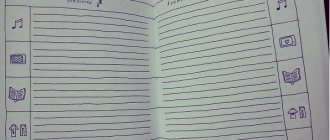Why keep a diary and is it effective: Pexels The main character of the book “The Notebook” used daily entries to remind his beloved of himself. Psychologist Marina Arkhipova and self-development expert Matt Davella believe that keeping a diary not only improves memory. This activity will replace sessions with a psychiatrist and will help get rid of negativity.
A diary allows you to achieve your goals
Any goal must be written down. An unwritten goal can simply fly out of your head, and you immediately forget about what you wanted. The written down goal gains strength by being deposited in your subconscious. When you write down a goal, the brain itself begins to look for ways to achieve it, just like an autopilot. Ask people who haven't achieved their goals whether the goals were written down - in most cases the answer is no. On the contrary, most people who achieve the desired results always have written goals in front of them. Write down goals in your diary: for five years, for a year, for a month, for a week, for the next day - success will be guaranteed.
Short
Diary studies are typically small and short. But there is enough data to conclude: writing down thoughts and feelings is useful. This helps cope with stress and reduce cortisol levels, alleviate symptoms of depression and even asthma, and improve memory. Only you need to describe in your diary not everyday life, but emotionally charged events: traumatic or, conversely, evoking gratitude. The first will free the mind from anxiety and pain. Secondly, it will help you notice joyful moments. However, there are other options for keeping a diary that will make your life better.
Keeping a journal helps you build your self-confidence
Look at all that you have already achieved since, say, birth! Firstly, you were already born and learned to read if you have read this far)) When I re-read my diary, I am amused by how the goals that I set for myself several years ago seem ridiculous and elementary to me today. It gives me a boost of energy and positivity every day. You can also build your self-confidence by doing a simple exercise: every day, write down at least 5 things you have accomplished and enjoy the results.
Why do you need to keep a personal diary?
Writing down thoughts and things that happened to you is quite a useful practice. Many people underestimate this. People do not spend enough time and attention to reflect on their lives, various moments, memories and experiences.
It's worth writing down everything that happens to you every day. This will help you become much more aware of where you are making mistakes. In addition, such personal journaling will help you understand your life much better and concentrate on your personal experiences.
You don't have to be Shakespeare
Most aspiring writers (whether they're writing a journal entry, an article for a popular magazine, or a lengthy novel) tend to be misled into thinking that everything they write must be deep and sensual. And when you start keeping a diary with such a delusion, you can be sure that it will lead to failure. Such activities are directed outward, at others, but you should keep a diary for yourself. True depth appears naturally, spontaneously, even by accident. Pretentiousness occurs when people deliberately try to appear smarter.
Shakespeare was a great writer because of his natural talent and careful study of human nature. But what's good for him doesn't have to be good for you. You don't have to show off your literary talent. You just need to write.
I advise my patients to forget about spelling, punctuation and just pour out their stream of consciousness on paper. This way, keeping a diary will help bring to the fore information that is stored a little deeper than consciousness. Let it pour out.
Maud Purcell
Researcher's Tool
The goal of the volunteer project “Live” is to collect personal diaries, both published and previously unknown, in one electronic library. We wanted to make a search tool for researchers to work through texts by tracking entries by date, topic, geographic location, gender, age, and diary type.
We interpret the word “diary” as broadly as possible - as a chronological sequence of dated entries by one person. However, the content and intentions of their authors may be different. There are no unimportant diaries - we never know what will be of interest to researchers and readers.
“Write an autobiography and don’t show it to your mom”: how to work on a book about your own life
Working with a large corpus of texts can give a researcher much more than individual diaries. We know of almost three thousand personal diaries in Russian and Ukrainian. We have more than half of them in electronic form, including two hundred previously unpublished manuscripts that we were able to copy and decipher ourselves with the help of volunteers. The project’s database already contains more than 360 thousand daily records of the 19th–20th centuries—that’s almost a thousand years of records from 1,400 authors, among whom are representatives of different social classes and professions.
Children and birds
The project team is especially fond of teenage diaries from the 1930s and 40s. Despite the fact that each time you can roughly guess their content, working with these texts is inspiring. Their authors are only groping for themselves, trying to build their identity. Sometimes you come across very children's diaries - like, for example, the entries for 1915 of a nine-year-old student at a private gymnasium:
“I studied in the morning. After breakfast we went to the boulevard and took flags and sleighs with us; Mom gave me a French flag, and Shura a Russian one. Irma came to the boulevard. We broke the sled."
Sometimes in naive youthful diaries you can find references to significant historical events: “The Constitution! Freedom of speech, assembly, press - all this was given by the manifesto of October 17, 1905. General joy and rejoicing! There are crowds of people with red flags on the streets, and the singing of the Marseillaise can be heard everywhere. There are no training anywhere until Monday, the shops are closed, the telegraph, post office, and power station are not working.” The project contains many teenage diaries of witnesses to the siege of Leningrad.
A common genre is a diary of monitoring a child, often these are notes about his health and development. For example, a manuscript entitled “How We Spent Time Without Mom” was written by the father of a two-year-old girl, who in 1966 was left alone with her while his wife went on vacation:
“Svetlana ate 2 eggs, cookies and coffee. Fell asleep at 11 o'clock. But I can't sleep. Only 4 days have passed. 16 more. Nightmare!”, “I fell asleep at 2 o’clock. Zina will arrive in 6 hours. We are waiting for her like God!”
There is a diary of a woman who kept it from 1947 to 2016: first she wrote about her daughter, and then she wrote about her granddaughter. The site also published a special diary about children - it was kept by Ekaterina Gracheva, the first Russian teacher-defectologist, from 1894 to 1917: “On the other wall (higher) is a shelf for toys. I was told that this was unnecessary - “idiots don’t understand toys.” I don’t agree with this: how can there be children without toys.”
I was surprised by the number of diaries describing bird observations. Such recordings are often of a working nature: they are a scientific tool for the ornithologist. Keeping such diaries was popularized by the Moscow club of young biologists, the legendary KYUBZ (Circle of Young Zoo Biologists. - Note T&P). As a rule, professionals recorded their observations (“Near the Pushkarevsky forest, among the apple tree plantations, I saw 7 gray partridges. They let me get quite close to them. The partridges ate quinoa seeds. A huge flock of linnets was feeding not far away...”), but sometimes amateurs also became interested in birds.
Cover of Andrey Bazulin's handwritten diary / prozhito.org
Remember me unreal
By default, diaries have a high level of reader trust. It is believed that this is a personal text, in which there is less room for conscious deception. This is often used by counterfeiters.
In addition to forging the entries of famous people - Faina Ranevskaya or Lavrenty Beria - people often forge their own diaries.
Anyone who wants to go down in history in a certain role writes memoirs, giving them the form of diaries for authenticity - a number of journalistic texts about the First World War and Soviet-era publications with the “diaries” of front-line soldiers belong to this genre.
Draft wall newspaper from the diary of Vasily Maklakov / prozhito.org
Leave room for content
When I buy a new Moleskine, I always skip the first two or three pages before I start journaling. When I fill my entire notebook (usually in a year), I wait a while and then re-read it.
As I re-read, I highlight notes or thoughts that I think are important, note the page numbers or date of writing, and then move them to the very beginning of the journal. This is how the content gradually develops, thanks to which I can easily find important entries. This helps me a lot when I face difficulties. I can look at how I have faced challenges in the past that seemed insurmountable but that I was eventually able to overcome.
Experts do not have a consensus on whether a diary needs a table of contents or not.
“Some people like structure, some people don't,” Pennebaker says. — Some people like to reread what they have written, others don’t. The point is to find a way that works for you."
Purcell has a different point of view: “I like the idea. Of course, some parts of the journal will seem more relevant to your life as a whole. And quick access to these notes will be useful, especially during confusing or stressful moments in life. It’s great to be able to remind yourself how you dealt with seemingly impossible situations in the past.”
Medical diaries as an opportunity to become healthier
Journaling can be a great tool for staying healthy. For example, the US National Institutes of Health notes the benefits of keeping records of your own well-being. A personal medical record will help you independently monitor various aspects of your health and communicate more effectively with your doctor - regardless of whether you see him regularly or come to see him for the first time.
To keep a health diary, you can use different schemes. For example, it can collect information about past illnesses and injuries, indicate hospitalizations and operations, talk about allergies and vaccines, family diseases and medications that you take. It is important to compare facts with dates. Moreover, the more detailed you fill out the diary, the better.
In addition, modern digital services allow you to monitor not only health in general, but also individual indicators. For example, the Clue app for women has a minimalistic period tracker and ovulation calendar. It’s also convenient to analyze different parameters (from skin condition to mood) depending on the days of the cycle. The Medisafe app will help you remember to take your pills - this is especially useful for those who take them regularly. In addition, Medisafe can be synced with health monitoring devices and monitor how your medications affect your condition.
A health diary can be an indispensable tool for people with chronic diseases. For example, it will be useful to control bronchial asthma, diabetes or atopic dermatitis. To do this, you can use the diaries in the Health.Ru application, created together with. The “Breathe Free” program has been developed for patients with asthma. —
in a smart diary you can record peak flow meter readings, note attacks and triggering factors, track allergens and other triggers and avoid worsening the condition.
The Atopy Live program also has an interactive diary for people with atopic dermatitis, in which you can not only record descriptions of conditions, but also upload photographs of the affected skin areas during treatment and thus monitor the dynamics. All these programs can be useful both for the patient himself to monitor his well-being, and for the doctor to adjust the treatment strategy. In addition, educational lectures are available in the applications: about common myths associated with diseases, treatment features and other important topics.
What are writing practices
Writing practice is an exercise that, unlike diary entries, has a structure and a specific task. For example, find a resource, make the right decision, see the situation from a new perspective. Good writing practice is characterized by clearly written instructions. It may indicate the execution time, as well as a certain sequence of steps.
You can practice writing on your own. You do not need any special education or training to do this. Great news for those who need support, but right now cannot, for whatever reason, go to a psychologist.
True, there are cases in which both structured practices and a diary can do more harm than good. If a person has difficulty concentrating, if he suffers from a mental disorder, or if he simply, for no apparent reason, notices that writing makes him feel worse, then this is not worth doing. Otherwise, it may turn out that you will not get out of the critical state, but, on the contrary, will aggravate it, creating more and more volume for immersion in the process of writing.
If you are now feeling interested and want to understand whether this type of self-support is right for you, try to start with a simple exercise that will help you end your day and better comprehend it. Choose a place where no one will disturb you. Take a notepad and pen that you feel comfortable using and that you enjoy (yes, that's important!). Within five to seven minutes, answer the questions:
- How did my day start?
- What do I remember most about the past day?
- If this day had a color, what would it be? What about the taste? Smell? Form?
- Is there something about the past day that I would like to keep in my heart, take into the future, make it mine? It could be a phrase, a meeting with someone, an impression, an important thought.
- Is there something in the past day that I would like to leave and not take with me into the future?
- If you define it in one single word, then at the end of this day, right now - what am I? The word that comes to mind may seem strange, illogical; the main thing is to just feel that this is it.
- What would I like to say goodbye to the passing day?
Rest for a couple of minutes and write down how you felt while you were doing the exercise? Has your condition changed in any way? What seemed important and what, perhaps, was unexpected? How are you feeling right now?
What to read
- The website of Daria Kutuzova, a psychologist and narrative therapist, thanks to whom written practices became known and became widespread in Russia.
- Kathleen Adams’ book “The Diary as a Path to Yourself” - if you want to study the topic of diary writing in more detail and try different written practices in structure.
How to protect your secrets?
It is extremely unpleasant to find out that someone outside has witnessed your spiritual anguish. Hiding a diary in an egg, an egg in a drake, and a drake in a chest on the seabed would not be very humane. Take advantage of more reliable ways to protect your personal space.
Gifer
- Buy a diary with a lock. Store shelves are filled with cozy notepads, accompanied by elegant keys.
- Make a hiding place. If you are afraid that your family might read your secrets, hide the diary in a box or under the sofa. More exotic places are perfect: a system unit, an old book cover or a case for a video cassette.
- Write in another language or several at once. In addition to making sure your thoughts are safe, you will improve your linguistic skills. Knowing several languages speeds up your brain.
- Come up with your own symbols. You can encrypt especially important words with pictures or symbols.
- Keep a diary in electronic format. If you are used to not letting go of gadgets, download the application you like and protect it with a password.










